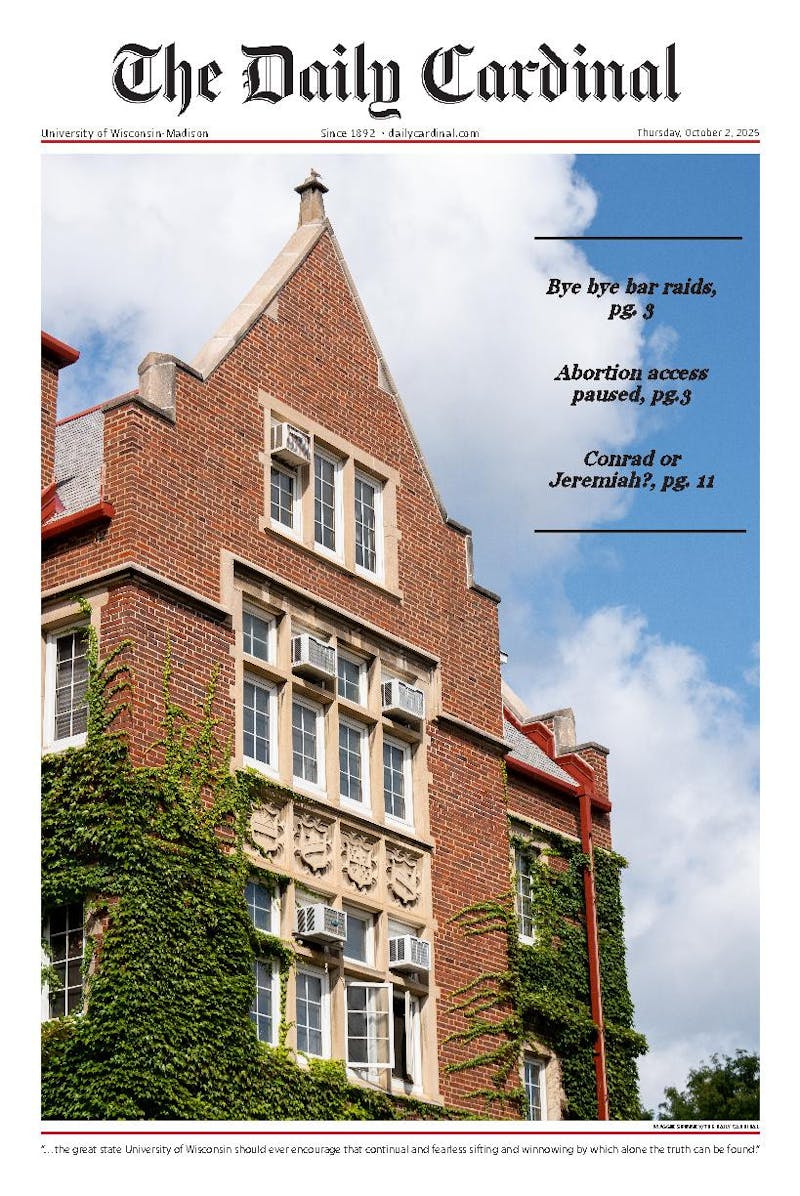Tuesday Sept. 17, 1985
Support TA bargaining bill
Editorial
Teaching assistants, no less than other state employees, deserve the right to form a union and bargain collectively with their employer, in this case, the University. Since 1980, the University has refused to negotiate a contract with the TA's union, preferring instead to implement policies and procedures unilaterally.
The state Joint Finance Committee will vote today on a bill which would remedy this situation, by requiring the University to negotiate a legally-binding contract with a union chosen by a majority of the TAs.
The issue here is not only fairness, but educational quality as well. The Teaching Assistants Association, which the University recognized as the TA's union prior to 1980, has consistently fought to help students get the most for their tuition dollar. It has, for example, opposed University attempts to enlarge class size and reduce the ratio of TAs to students.
Tuesday Sept. 17, 1985
Moment of Truth—TA bargaining bill faces committee vote
By: Randall Tewsbury
The Joint Finance Committee will vote Wednesday on the Collective Bargaining Bill for Graduate Assistants of the UW System. Passage of the Bill will enable teaching assistants to bargain collectively through the UW Teaching Assistant's Association and make all agreements negotiated by the TAA and the Administration legally binding.
Until now, administrators have bargained with the TAA, but since the agreements are not covered by state collective bargaining law, the administration could disregard unfavorable decisions.
TAA Co-president Ross Finnie said that passage of the bill is necessary to ""ensure the quality of undergraduate educations."" Finnie cited insufficient appointment levels. over-size classes, and unilateral grievance procedures as major concerns of the TAA.
Erin Crawley, co-chairperson, TAA Organizing Committee said that the TA's ""are willing to work and are concerned with maintaining the quality of our courses but we're students too... I end up teaching and grading all the time—for free."" Of the 600 TAA members most are willing to work for free rather than let course quality slip or leave assignments ungraded, Crawley said. Finnie added that ""TAs still manage to come up with TA dues out of their own pockets, ""despite the fact that they are not salaried.""
""TAs are workers in the classical sense and need protection all the more since their work-place is also their academic environment,"" Finnie said, ""They are particularly susceptible to departmental politics and need an organization to represent their before the administration.""
Although the TAA is an organization composed solely of graduate students, the organization draws support from many labor groups and its current bill has been endorsed by 14 labor groups including the state AFL-CIO, and the Wisconsin Federation of Teachers. TAs have worked without a collectively bargained contract for over six years. If the current bill passes, the TAA could begin bargaining a contract by this spring.
Thursday Sept. 19, 1985
Bargaining bill approved
By: Mark Saxenmeyer
Neither those in favor nor those against a bill granting collective bargaining rights to members of the Teaching Assistants Association expressed surprise Wednesday when the legislation nudged its way through the Wisconsin Joint Finance Committee by a 9 to 6 margin.
Despite their tranquil reactions, each side continued to staunchly defend their opposing viewpoints. Millard Susman (University committee member) maintained that collective bargaining, a TA-held power through the 1970s. ""had a very negative effect on the atmosphere between TAs and faculty."" He said the relationship had and would again be ""combative.""
TAA Co-President Ross Finnie contended that while University officials may believe the current TA governing process—Committee on Teaching Assistants' Policies and Procedures— is working smoothly, ""whenever you have a master-slave relationship there's less conflict."" He said that collective bargaining would create ""two sides of equals where things can be resolved, rather than just simmer.""
Susman also said that because TAs are ""temporarily at the University, and because they're not just teachers, but learners too, their position is not quite the same as that of regular state employees. They're not going to be here six or seven years from now,"" he said.
Finnie, however, argued that the tenure of TAs ""is about equal to the national average"" of any employees anywhere, or lasting approximately three or four years. He said that because of long-term academic demands, graduate assistant TAs are ""immobile.""





